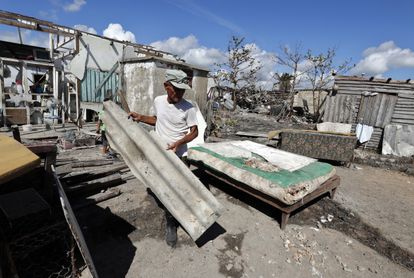Two people cross one of the streets flooded by the passage of hurricane ‘Ian’, in Havana (Cuba), on September 28, 2022.
The always difficult Cuba-US relations, which have marked the Cuban international and national agenda for six decades, are once again topical for unprecedented and contradictory reasons. Following an unusual Cuban initiative, the Joe Biden Administration announced on Tuesday that it will allocate two million dollars in humanitarian aid to support the victims of Hurricane Ian, which devastated Pinar del Río and the westernmost provinces of the island as it passed through the island. island, affecting more than 100,000 homes and causing millionaire losses in agriculture – tens of thousands of people are still without electricity in some towns in Pinar del Río three weeks later. The Cuban Government, in another unusual gesture.
It is noteworthy that the funds are assigned by the United States Agency for International Development (USAID), an institution that concentrates most of the North American international collaboration and which Cuba has accused on several occasions of providing financing to exile groups and organizations that, “under the excuse of promoting democracy” on the island, seek to “subvert order” and aspire to promote a “regime change” in Cuba.
As background to the aid announced now, after the devastating fire in some fuel storage depots at the supertanker base in the port of Matanzas, last August, Washington collaborated with technical advice and by sending uniforms for firefighters, as confirmed by the Cuban minister of Foreign Relations, Bruno Rodríguez, a “gesture” that he also thanked. The Cuban government, although it has accepted both offers, argues that if the United States wants to truly help the island’s inhabitants, it must put an unconditional end to the economic and financial embargo that has lasted 60 years, and which it considers the main cause of its ills.

A man rebuilds his house destroyed by the passage of hurricane ‘Ian’, in the province of Pinar del Río (Cuba), on October 15, 2022.
On Wednesday, the Cuban foreign minister presented a document in Havana that will be put to a vote in November at the UN General Assembly, in which he condemns the United States for its policy of “blockade” of the island and makes a evaluation of the damage that this has caused to the Cuban economy in the last year. Rodríguez assured that, during Donald Trump’s time as president, the intensification of the embargo and the policy of economic suffocation reached unprecedented levels, and he opined that “unfortunately” little or nothing has changed with the Biden Administration, since the more than 240 measures and sanctions decreed by the previous president, among them the inclusion of Cuba in the list of sponsors of terrorism.
According to the data offered by Rodríguez, in the first 14 months of the Biden administration, the Cuban economy has suffered losses worth more than 6.3 billion dollars due to this embargo policy, which, he said, was not even eased at the time hardest of the pandemic. The official stated that, despite the fact that the Helms-Burton law “codified” the embargo and only the US Congress, not the president, can decide to lift it, Biden does have the possibility and the “moral duty” to adopt “humanitarian exemptions” before the serious crisis that the island is suffering due to the effects of the pandemic and the US sanctions themselves. Regarding the flexibility measures announced on May 16 by the US Government in terms of visas, regular migration, reestablishment of direct flights and remittances.
Rodríguez pointed out when presenting the report that “the intensification of the blockade has been accompanied by an unusual increase in disinformation operations, financed with federal funds from the United States budget”, with the purpose, among others, of manufacturing an internal political opposition and generate disorder and instability in Cuba. Part of these funds are from USAID, the same agency that will now lead the North American contribution to those affected by Hurricane Ian. During the last 30 years, Cuba has brought to the United Nations resolutions condemning the US sanctions policy, which have always been approved by an overwhelming majority.







